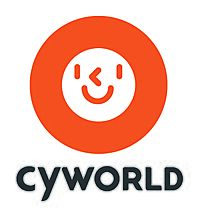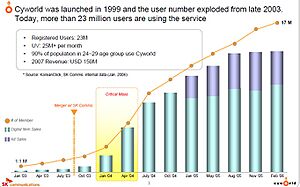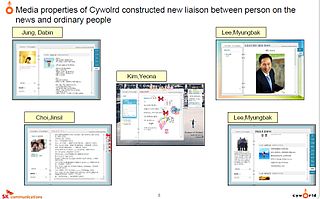Cyworld facts for kids
 |
|
|
Type of site
|
Social network service |
|---|---|
| Available in | Korean, Chinese, English, German, Japanese, Spanish, Vietnamese |
| Owner | CyworldZ |
| Website | cyworld.com (Korea) |
| Cyworld | |
| Hangul |
싸이월드
|
|---|---|
| Revised Romanization | Ssaiwoldeu |
| McCune–Reischauer | Ssaiwŏltŭ |
| Stable release | |
|---|---|
| Operating system | iOS, Android |
Cyworld (Korean: 싸이월드) is a social network from South Korea. It helps people connect and make friends online. Cyworld started as part of a bigger company, SK Communications. In 2014, it became its own company.
Users on Cyworld create special friendships called Ilchon (Korean: 일촌). They also have their own personal online spaces called minihompy. You can create an avatar and decorate a "mini-room." This makes it feel a bit like playing a game where you design your own space.
The "Cy" in Cyworld can mean "cyber." But it's also a play on a Korean word (Korean: 사이) that means "between" or "relationship." This shows that the site is all about connecting people.
Cyworld is similar to other social networks. A big difference is how it makes money. Users buy dotori (Korean: 도토리), which are like virtual acorns. You use these acorns to buy fun things for your online space. This includes background music, virtual furniture, and other decorations.
Cyworld also has users in countries like China and Vietnam.
Contents
The Story of Cyworld
How Cyworld Started
Cyworld first launched in 1999. A company called SK Communications bought it in 2003. It was one of the first companies to earn money by selling virtual items online.
Cyworld became very popular in South Korea. By 2005, almost everyone in their twenties used it. About 25% of the whole South Korean population were users. In 2006, it had 19 million users in Korea.
Cyworld tried to become popular in other countries too. But it didn't do as well everywhere. By 2010, Cyworld stopped working in Germany, Japan, and the United States. However, it continued to serve users in China and Vietnam. In 2009, it had 7 million users in China and 450,000 in Vietnam.
The First Steps
The idea for Cyworld began in 1999. It came from a student group at KAIST university. They wanted to create a website for online business projects. The students thought of making a social networking site. One student, Dong-Hyung Lee, kept working on the idea after graduation. He became the CEO in December 1999.
The word 'cy' in Korean means 'between people'. This highlights how the website helps people connect. Dong-Hyung Lee wanted to build an online community. He wanted people to form close relationships, not just find business contacts.
Cyworld was different when it first started. It showed lists of members from the same hometown or school. It was more like an online address book. It helped people find contact information to meet offline. In its early days, Cyworld was not very successful. It even lost a lot of money.
The Minihompy Idea
In the summer of 2002, Cyworld tried a new idea called "minihompy." This was a last chance to save the company. It was a huge success right away.
The minihompy let users express themselves in many ways. It had features like a main picture, a diary, photo albums, and a bulletin board. You could also play background music. Another cool part was the miniroom. This was a virtual room you could decorate with online furniture.
People loved minihompy because older "individual homepages" were hard to use. You needed to know computer coding to make them. Minihompies were easy to create and update. They also let people talk to each other. You could leave comments and see who visited your page. To see someone's full minihompy, you had to become their Ilchon.
The minihompy service officially launched on September 9, 2002. Cyworld also introduced its own online money called dotori (acorns). Users bought items for their minihompy and miniroom with dotori. People enjoyed spending money on dotori to make their online spaces unique.
Cyworld became even more popular in November 2002. A rival website, Freechal, started charging users money. Many users left Freechal and joined free sites like Cyworld.
Joining SK Telecom
In August 2003, Cyworld joined with SK Telecom. This is a big Korean communication company. Cyworld had so many new users that it needed help to manage them. SK Telecom offered resources for Cyworld to grow even more. Cyworld kept its name and services.
This merger led to great success. By the end of 2003, people started using new words like "cyholic" (someone addicted to Cyworld). Cyworld became a sensation in Korea. Its monthly visitors jumped from 2 million to 7 million in less than a year.
Cyworld's success grew further in 2005. It teamed up with NateOn, a popular online messenger service. This allowed users to use both Cyworld and Nate-on by logging in just once.
By early 2007, Cyworld had over 20 million members. This was about half of South Korea's population! In 2009, Cyworld combined its website with SK's Nate portal. This made it easier for users who used both services. By 2011, Cyworld had more than 25 million members.
Challenges and Changes
When Facebook started in Korea in 2009, Cyworld began to face competition. Some people found Facebook's design simpler and easier to use. Cyworld also didn't offer global services. This made it harder for people to connect with friends around the world.
The rise of smartphones also changed things. Facebook and Twitter worked better on mobile phones. Other services like Kakao Story, which connected with the popular mobile app KakaoTalk, also gained many users. Cyworld struggled to keep up with these new trends.
Cyworld's popularity also dropped after a big event in 2011. In July 2011, criminals hacked into Cyworld and Nate. They stole personal information from over 35 million users. This included details for almost 70% of the Korean population. Even though the company said some information was safe, many people were worried.
SK Telecom tried to fix the problem. But they faced many lawsuits from upset users. The company's reputation was damaged. Many Koreans, who care about their personal information, moved to other social networks. This led to a big drop in Cyworld's website visits.
In September 2012, SK Telecom changed its rules. Users could now join Cyworld without giving their resident registration numbers or real names. They only needed to provide an email address and nationality.
Cyworld ended its minihompy service on September 31, 2015. It planned to switch to a new platform called Cyhome.
In July 2020, the website had some technical issues. It was not using the latest security technology. This caused web browsers to show warnings.
New Ownership
In April 2021, a company called CyworldZ took over Cyworld. CyworldZ got all the user data from SK. They planned to bring Cyworld back with new features, including a metaverse-powered service.
In 2016, Cyworld was bought by Aire, Inc. Then, in December 2020, CyworldZ took over from Aire, Inc.
Cyworld Around the World
After its success in Korea, Cyworld tried to expand globally. In 2005, it started services in China. Later, it entered Japan and Vietnam. However, Cyworld lost to Japan's Mixi and left the Japanese market in 2008. In 2009, its operations in China and Vietnam were more successful.
Cyworld entered the US market in 2006. It hoped many US teenagers would use multiple social networks. But it lost users to Facebook and left the US market in 2010.
In 2006, Cyworld also partnered with a German company, T-Online. They launched a European version a year later. But there was strong competition from other sites. Cyworld closed its European operations by 2008.
How Cyworld Works
Ilchon Friendships
Ilchon is a Korean word for very close family ties. On Cyworld, becoming ilchon is how users connect. You send an ilchon request to another user. If they accept, you can see parts of their minihompy that others cannot. This includes their diary and photo sections. You can also mark some friends as "interest ilchon." You get a notification when their homepage is updated. You can also see if your friends are online. Before Twitter and Facebook, the Ilchon system was very popular in Korea.
Dotori Currency
Cyworld uses its own virtual money called dotori (Korean: 도토리), or acorns. Dong-Hyung Lee created this idea in 2002. One dotori costs 100 won. You use them to buy virtual items. Prices vary, for example, a wall painting might cost 2 acorns. A song for your miniroom might cost 6 acorns. A homepage background that lasts a year could be 40 acorns. Most items bought with dotori have a time limit. You can also give dotori to your ilchons, often as birthday gifts.
Selling dotori is the main way Cyworld makes money. In 2006, 80% of Cyworld's income in Korea came from selling these virtual items. In 2018, a new service called CLINK was launched. It aimed to develop a digital currency system. CLINK later replaced dotori with podo and also showed coconut as a currency.
Minihompy Personal Space
A minihompy is like your own online space on Cyworld. You can use dotori to decorate your minihompy however you like. It has features such as a main background, a profile, a photo story, and a diary. These let you express yourself. The miniroom is a virtual room with a minime (your avatar). You can decorate this space with virtual items bought with dotori. You can buy new backgrounds, miniroom furniture, background music, and special fonts. There are also features like ilchon padotagi, which lets you easily visit your friends' minihompies. Random padotagi lets you explore strangers' minihompies.
Online Clubs
Clubs are online communities for Cyworld users. Just like with minihompies, you can use dotori to decorate your club. They are similar to online clubs on other websites.
Cyworld Blog
The Cyworld blog is like blogs on other websites. You can use dotori to decorate your blog. Anyone can usually see your blog content. But you can also set it so only your ilchons can view it. Blogs have features like photo logs and bulletin boards. Cyworld blogs also connect with NateOn.
NateOn Messenger
Cyworld works with NateOn (Korean: 네이트온), a popular instant messenger in Korea. If you buy special fonts with dotori on Cyworld, you can use those same fonts in NateOn.
Que News Service
Que is an application that provides daily news briefings.
Cyworld's Influence
Cyworld had a big impact on internet culture in Korea. The term "cyholic" shows how popular it was. Cyworld gave users a place to express their feelings to their ilchons. It also let people learn about others' lives by visiting their minihompies.
A unique feature was the tracker on each minihompy. It showed two numbers: "today" (visitors that day) and "total" (total visitors). A high number of visitors often meant the minihompy owner was popular. "What's his today?" became a common phrase. Some online tools even helped users increase their visitor numbers.
Celebrity diaries were very popular. They received thousands of comments. Minihompies became a way to learn about celebrities' lives. Celebrities also used their minihompies to manage their public image or promote their projects.
Awards and Music
Awards Cyworld Won
In 2006, Cyworld received the Wharton Infosys Business Transformation Award. This award recognized Cyworld for using technology in a great way to change its business.
Cyworld Music Projects
Cyworld launched a project called "Cyworld BGM 2021." This project featured artists remaking popular songs that were often used as background music on homepages.
- Soyou – "Y (Please Tell Me Why)"
- Gift – "Time Walking on Memory"
- Gaho – "Officially Missing You"
- Ailee – "Snow Flower"
- Jung Seung-hwan – "I Have a Lover"
- George – "I'll Change"
- Ha Sung-woon & Punch – "Johnny"
- Hwang Chi-yeul – "Nagging"
- Mad Clown & Lee Hae-ri – "Recipient Unknown"
- Fromis 9 (Song Ha-young, Park Ji-won, and Lee Seo-yeon) – "Star"
- Daybreak – "A Good Day"
- Wonstein – "10 Minutes"
- San E & Suran – "Photography"
- Kang Daniel & Chancellor – "Fly"
- Yuju – "By Your Side"
More to Explore
- Cyworld Digital Music Awards
- Myspace
See also
 In Spanish: Cyworld para niños
In Spanish: Cyworld para niños
 | Kyle Baker |
 | Joseph Yoakum |
 | Laura Wheeler Waring |
 | Henry Ossawa Tanner |



